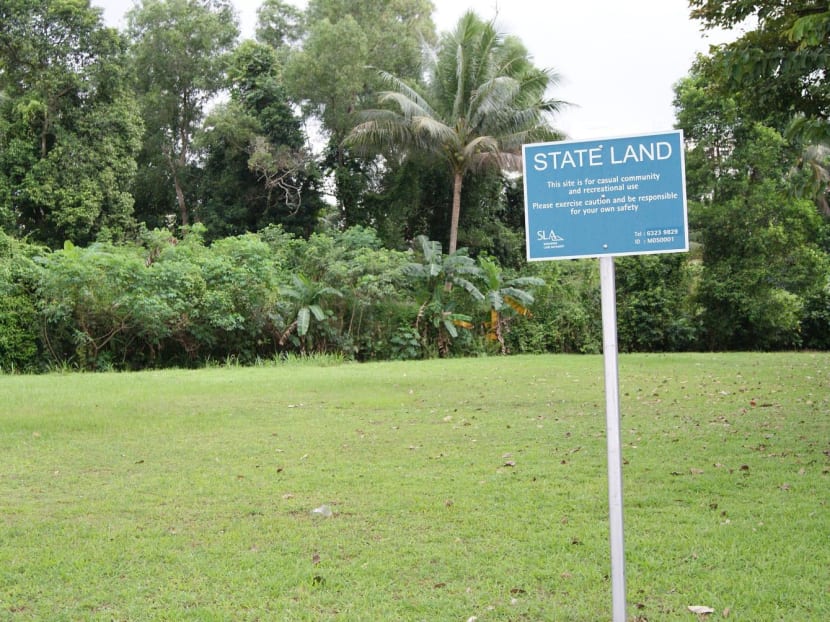Bill proposes stiffer penalties for trespassing on state land; first review of law since 1974
SINGAPORE — Intruders on state land are set to face stiffer penalties if a Bill is passed to replace laws not been reviewed since 1974, which include outdated terms such as “forest rangers” and “Penghulus” (Malay for village chief).

- The State Lands Protection Bill, if passed, will replace the existing State Lands Encroachment Act
- The laws, which outlaw the trespassing of state land, were last reviewed in 1974 and are outdated, the Singapore Land Authority said
- The Bill carries stiffer penalties and gives the authorities stronger enforcement powers to protect state land
SINGAPORE — Intruders on state land are set to face stiffer penalties if a Bill is passed to replace laws not been reviewed since 1974, which include outdated terms such as “forest rangers” and “Penghulus” (Malay for village chief).
The State Lands Protection Bill was tabled in Parliament on Monday (Nov 7) by the Ministry of Law.
If passed, it would replace the State Lands Encroachments Act, which stipulates penalties for trespassing, allows the state to recover abandoned land and provides powers for removing unlawful occupants from state land.
The proposed law would give the Singapore Land Authority (SLA) stronger enforcement powers to protect state land than the current legislation.
Since the legislation’s last review, “the types of encroachments and misuse of state land have evolved, rendering many of the Act's provisions outdated and ineffective”, SLA said in a statement.
In response to TODAY's query, SLA said that it handles an average of 180 encroachment cases a year. Examples of these cases included items such as shop displays or joss-paper burning cages being placed on state land.
The introduction of the Bill came in the wake of some high-profile cases last year involving trespassing on state land.
In January 2021, an architect was fined S$4,000 and his wife fined S$3,000 for unlawfully occupying a parcel of state land near their three-storey house in Seletar for close to 15 years, reportedly the first people to be prosecuted for trespassing on state land.
Their house, built in 2005 but left vacant after completion, effectively annexed the 144.2 sqm land as the property’s driveway, meaning it took possession of the land without permission.
It led to a years-long delay in drainage upgrading works because national water agency PUB was unable to start work on a section of the drain bordering the property, causing the agency to incur about S$24,000 spent on temporary flooding measures.
Two months later, a 75-year-old retiree’s secret hideaway tucked in a forest in Chua Chu Kang made headlines after a hiker stumbled on the makeshift lodge, where the retiree had set up shelter and tended to his crops during the day for the past 10 years.
The hiker alerted the authorities and SLA ordered the retiree to clear and vacate the site, The New Paper reported.
The Bill will be debated in Parliament at a sitting slated for later this month.
STIFFER PENALTIES
Penalties in the Bill have been increased to move in line with comparable penalties in newer legislation such as the Parks and Trees Act, which deals with nature reserves and national parks that are also state land, SLA said.
The majority of offences under the proposed legislation will carry a fine of up to S$50,000 — an increase from S$5,000 typically under existing laws — or jail for up to six months, or both.
Higher penalties of up to S$100,000 or jail for up to 12 months, or both, may be imposed on repeated offences of illegal dumping using a vehicle.
NEW OFFENCES
The Bill introduces new offences, such as the parking of vehicles on state land without lawful authority.
It also updates certain definitions in existing laws to clarify that external features protruding from buildings, such as awnings, over state land may constitute an encroachment.
ENFORCEMENT POWERS
Officers will have powers to enter and inspect any land without a warrant if there is “reasonable suspicion that the land is used in the commission of an offence”.
They may also compel suspected offenders to disclose their identity.
The legislation would also allow the authorities to issue composition fines of up to S$5,000 for minor offences. Existing laws only allow fines to be meted out by the courts.
Officers may also directly issue encroachment notices for offenders to stop unlawful activity on state land without having to apply to the courts.
If there is a failure to comply with the encroachment notice and where a person or offender does not give an objection, officers may carry out works to remove unlawful structures or occupants from the site and recover the expenses incurred.
However, if there is an objection to the notice, the authorities may apply for interim injunctions with the courts against a person before conviction, to prevent or minimise irreparable damage to state land or prevent danger.
COMPENSATION ORDERS
The Bill allows the courts to order offenders to make monetary compensation for more types of loss or damage suffered by the Government due to the offence.
Examples include compensation of the costs incurred during the removal of objects left on state land or the value of sand, timber or minerals removed.
Under existing laws, the court may only order the offender to pay the value of any timber or government property destroyed during the unlawful occupation and the expense of the survey for proving the unlawful occupation.
ABANDONED LAND
Under existing laws, land that has been abandoned for three years or more is forfeited to the state if nobody is able to claim the land six months from the date of a gazette and from when a notice is posted on the land.
The Bill reduces the claim period to three months.
“SLA will still publish the notice in a manner that will secure adequate publicity,” the authority said.











